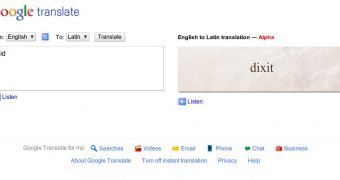Google has announced that it has added another language to the ones supported by Google Translate, Latin. What makes this language special is that this is the first "dead" language supported in Translate. While there are no native speakers of Latin today, it is by far one of the most used dead language.
Google chose a rather original way of making the announcement, the entire blog post is written in Latin.
While it means that few will be able to make out what Google is saying just by stumbling onto the post, it also means that many will go directly to Translate to make sense of it, putting the new feature to good use before they even know about it.
"Hodie nuntiamus primum instrumentum convertendi linguam qua nulli nativi nunc utuntur: Latinam," Jakob Uszkoreit, Ingeniarius Programmandi, dixit.
Or, if you prefer a language you actually understand: "Today, we announce the first language translation system by which no native speakers now make use of: the Latin," the translated version of the post reads.
"That language barriers be torn away and the knowledge of the world is made accessible and useful, translation systems of many languages of the nations were created by us," Google said.
"Being but a few speak Latin daily, year by year more than a hundred thousand American students receive the National Latin Exam. Besides many people all over the world study Latin," it explained.
You're very likely to come across Latin in any number of things you may be studying, from maths to philosophy.
Translating from Latin is a special challenge for machine translation systems. Google's system relies on analyzing massive amounts of text written in a language and their human-translated versions.
This approach scales best and has proven quite accurate. But it relies on existing translated material, the more books or articles it can find, the better the translation becomes.
Because most of the works in Latin have already been written and very few new ones are being created now, the volume of data available is rather small. At this time, Latin is labeled as an Alpha so results may vary.
Google is heavily invested in its translation technologies. The technology can be applied to any number of products, like the recently demonstrated virtual translator for Android phones.

 14 DAY TRIAL //
14 DAY TRIAL //